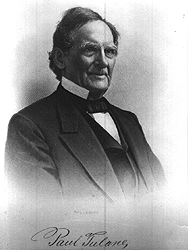
Paul Tulane
Encyclopedia

Philanthropist
A philanthropist is someone who engages in philanthropy; that is, someone who donates his or her time, money, and/or reputation to charitable causes...
, was born near Princeton
Princeton, New Jersey
Princeton is a community located in Mercer County, New Jersey, United States. It is best known as the location of Princeton University, which has been sited in the community since 1756...
, New Jersey
New Jersey
New Jersey is a state in the Northeastern and Middle Atlantic regions of the United States. , its population was 8,791,894. It is bordered on the north and east by the state of New York, on the southeast and south by the Atlantic Ocean, on the west by Pennsylvania and on the southwest by Delaware...
, the son of Louis Tulane, a French immigrant, and Maria Tulane. He was educated in private schools, including Somerville Academy of New Jersey, until he was fifteen years of age. He clerked briefly in a store in Princeton and thereafter spent three years touring the southern United States with a well-educated male cousin, who was a member of the bar in France. It was from this tour that Tulane developed a keen interest in New Orleans.
In 1822, he established Paul Tulane and Co. in New Orleans, a retail and wholesale dry goods and clothing business. Later, he invested in real estate in both New Orleans and New Jersey. By 1828, he had amassed a fortune of over $150,000. His business operated for nearly 40 years. He retired with a large fortune in 1857. About this time he bought the Stockton place in Princeton, where he subsequently resided. During the American Civil War
American Civil War
The American Civil War was a civil war fought in the United States of America. In response to the election of Abraham Lincoln as President of the United States, 11 southern slave states declared their secession from the United States and formed the Confederate States of America ; the other 25...
, Tulane was the largest donor in New Orleans to the Confederate States of America
Confederate States of America
The Confederate States of America was a government set up from 1861 to 1865 by 11 Southern slave states of the United States of America that had declared their secession from the U.S...
, but the historian John D. Winters
John D. Winters
John David Winters was a historian at Louisiana Tech University in Ruston, Louisiana, best known for his definitive and award-winning study, The Civil War in Louisiana, still in print, published in 1963 and released in paperback in 1991.-Background:Winters was born to John David Winters, Sr...
in his Civil War in Louisiana (1963) does not give the amount Tulane contributed.
For many years he gave liberally to the charitable institutions and Presbyterian churches of Princeton and New Orleans. In 1882, he donated $363,000 (1882 value) to improve higher education in the city of New Orleans. Tulane's Act of Donation ultimately resulted in the renaming of the University of Louisiana (founded as the Medical College of Louisiana) to The Tulane University of Louisiana
Tulane University
Tulane University is a private, nonsectarian research university located in New Orleans, Louisiana, United States...
, in his honor and turning the once public institution into a private one, the only such instance in United States history. He died near Princeton, and is buried in the Princeton Cemetery
Princeton Cemetery
Princeton Cemetery is located in Borough of Princeton, New Jersey. It is owned by the Nassau Presbyterian Church. John F. Hageman in his 1878 history of Princeton, New Jersey refers to the cemetery as: "The Westminster Abbey of the United States."...
on Witherspoon Street. In his honor, he has several streets named after him throughout the country, including Tulane Street in Princeton, and Tulane Avenue in New Orleans.

